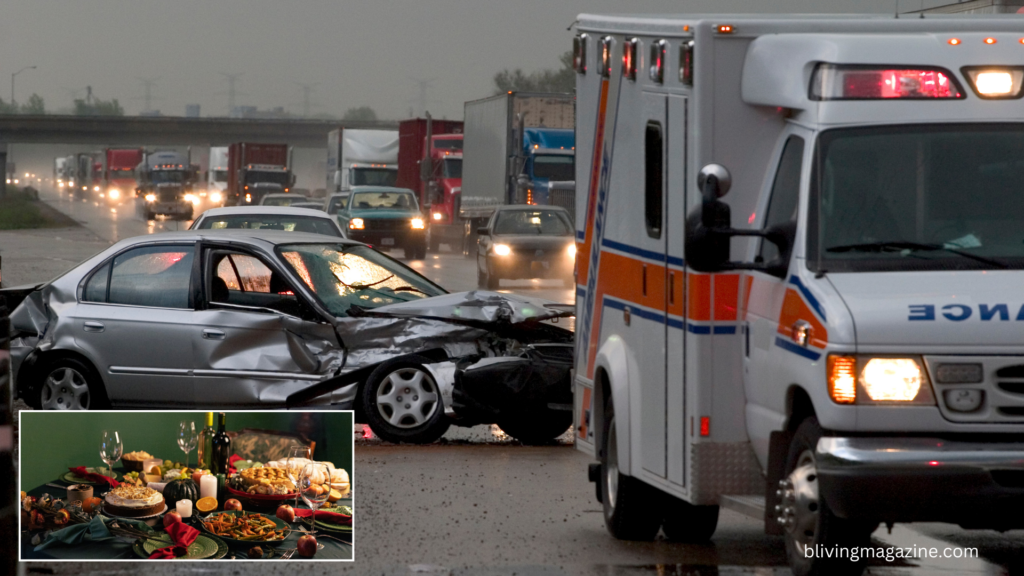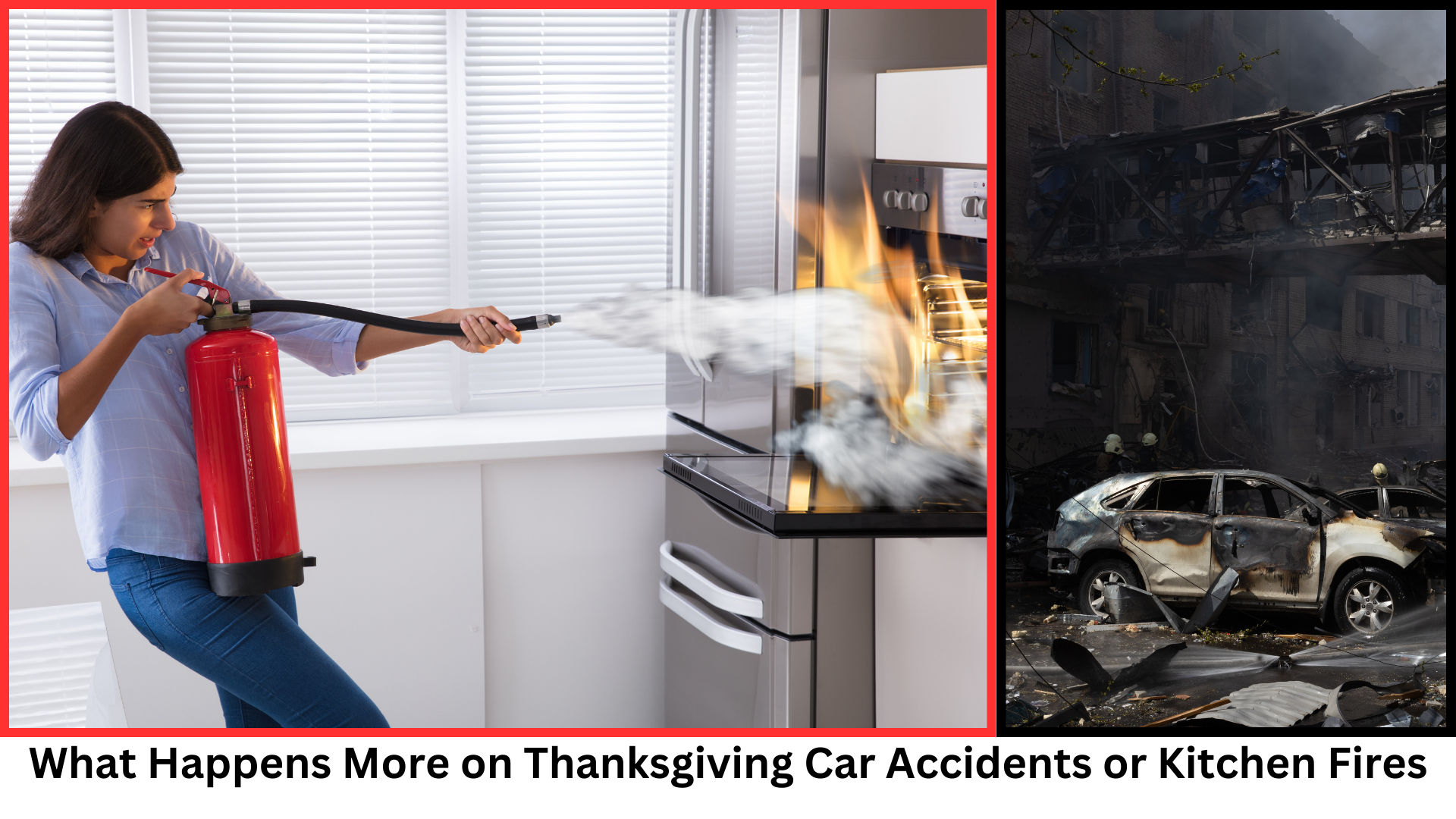Thanksgiving is a time of celebration, family gatherings, and indulgence in hearty meals, but it is also a time when certain risks escalate. While many people are focused on enjoying their turkey and mashed potatoes, others are concerned about safety, particularly when it comes to car accidents and kitchen fires. These two hazards often make the headlines, but how do they compare in terms of frequency and severity on Thanksgiving? In this article, we will explore the likelihood of car accidents versus kitchen fires during this holiday, how they happen, and the steps you can take to avoid them.
The Thanksgiving Rush and Car Accidents
One of the most significant concerns during Thanksgiving is the rise in car accidents. As families travel long distances to reunite with loved ones, roads become congested, and the risk of accidents increases. According to the National Highway Traffic Safety Administration (NHTSA), Thanksgiving sees a marked increase in traffic-related fatalities, with the period from Wednesday evening to Sunday night being particularly dangerous. Many drivers are on the road for longer periods, traveling at night or during inclement weather, all of which increase the chances of accidents.
Causes of Thanksgiving Car Accidents
Several factors contribute to the uptick in car accidents during Thanksgiving. One of the primary reasons is the sheer volume of traffic. The American Automobile Association (AAA) estimates that millions of people travel during the holiday season, leading to crowded highways and increased chances of collisions. But it’s not just the number of cars on the road that causes concern; there are several contributing factors:
- Distracted Driving: With more people using their smartphones for directions, social media, or communication, distracted driving is at an all-time high. Taking eyes off the road for even a second can lead to disastrous results.
- Impaired Driving: Alcohol consumption spikes during Thanksgiving, and unfortunately, so does impaired driving. Many drivers may not think twice before getting behind the wheel after a few drinks, which can lead to tragic accidents.
- Fatigue: Traveling long distances or staying up late to prepare for the holiday feast can result in fatigued drivers. Fatigue impairs reaction times and decision-making, making it just as dangerous as driving under the influence.
- Weather Conditions: Depending on the region, Thanksgiving weekend can bring winter weather, including rain, snow, and ice. These conditions can make roads slippery and increase the likelihood of car accidents.
- Speeding: With the pressure to arrive at a Thanksgiving dinner on time, some drivers may engage in speeding, which reduces their ability to react to sudden changes in traffic or road conditions.
Statistics on Car Accidents During Thanksgiving

Data from the NHTSA highlights that Thanksgiving is one of the most dangerous holidays for motorists. Between 2015 and 2019, there was an average of 341 fatalities each year on U.S. roadways during the Thanksgiving weekend. The period between 6:00 p.m. on Wednesday and 5:59 a.m. on Sunday is particularly hazardous, with a substantial increase in deaths compared to a typical weekend. Alcohol-impaired driving is often a major contributor to these fatalities, accounting for nearly one-third of all Thanksgiving-related road deaths.
Kitchen Fires: A Serious Thanksgiving Hazard
While car accidents are a major risk during Thanksgiving, kitchen fires are another significant concern. With cooking being a central aspect of Thanksgiving celebrations, the kitchen becomes the heart of the home. However, the busy nature of preparing a large meal, combined with distractions, can lead to dangerous accidents. According to the National Fire Protection Association (NFPA), Thanksgiving is the peak day for home cooking fires in the U.S., with kitchen fires occurring at a much higher rate than on other holidays.
Causes of Kitchen Fires on Thanksgiving
Kitchen fires can result from a variety of factors, many of which are unique to Thanksgiving due to the large quantities of food being prepared. Some of the most common causes include:
- Unattended Cooking: The most common cause of kitchen fires is unattended cooking. With multiple dishes being prepared simultaneously and guests arriving, it’s easy to become distracted and forget about food on the stove or in the oven.
- Grease Fires: Deep-frying a turkey is a Thanksgiving tradition for many, but it also comes with a risk of grease fires. If the oil temperature becomes too high or if the turkey is improperly thawed, a flash fire can occur, resulting in significant property damage or injuries.
- Overheated Appliances: The large number of dishes being prepared on Thanksgiving can put a strain on cooking appliances. Overheating can cause malfunctioning or even fire hazards, especially if appliances are not maintained properly.
- Flammable Items Near Heat Sources: On Thanksgiving, kitchens are often cluttered with items such as dish towels, paper towels, and packaging materials, which can easily catch fire if they come into contact with hot surfaces or open flames.
- Cooking While Under the Influence: Similar to the risk of impaired driving, alcohol consumption during Thanksgiving dinner can lead to an increased risk of kitchen fires. Cooking while intoxicated can impair judgment, increasing the likelihood of accidents.
Statistics on Kitchen Fires During Thanksgiving
Kitchen fires during Thanksgiving are more common than you might think. The NFPA reports that cooking equipment was involved in 49% of all reported home fires in the U.S. during Thanksgiving, and this is a significant increase over other holidays. The most common type of cooking fire involves stoves and ovens, accounting for 51% of these incidents. Fryers are particularly hazardous, with the NFPA noting that deep-frying turkey fires cause an average of $15 million in property damage annually.
The number of kitchen fires on Thanksgiving can be staggering. According to the U.S. Fire Administration (USFA), the holiday sees more than double the number of home cooking fires than a typical day. In 2018, fire departments in the U.S. responded to more than 1,700 cooking fires on Thanksgiving alone, a significant rise from the average 400 to 500 fires on a typical day.
Comparing the Risks: Car Accidents vs. Kitchen Fires
So, which is more common during Thanksgiving—car accidents or kitchen fires? Based on the available data, both are serious risks, but car accidents tend to occur at a higher rate than kitchen fires, at least in terms of fatalities.
While Thanksgiving sees a dramatic rise in kitchen fires, especially with the added dangers of deep-frying turkeys, the number of car accidents is generally higher. The NHTSA estimates that over the Thanksgiving holiday weekend, car accidents result in hundreds of fatalities, far exceeding the number of fire-related fatalities in the kitchen.
However, the severity of the accidents should also be considered. Car accidents are often more catastrophic, with the potential for serious injury or death. On the other hand, while kitchen fires can cause significant property damage and injuries, fatalities are less common in cooking-related incidents.
Tips for Staying Safe on Thanksgiving
While it’s impossible to eliminate all risks during Thanksgiving, there are several ways to reduce the likelihood of car accidents and kitchen fires:
Preventing Car Accidents:
- Avoid distractions: Put down the phone and focus on the road.
- Don’t drive under the influence: Designate a sober driver or use a ride-sharing service.
- Take breaks: If driving long distances, stop for rest breaks to avoid fatigue.
- Check weather conditions: Plan for any inclement weather and adjust your driving accordingly.
- Obey traffic laws: Speeding increases the chances of accidents, so stick to posted limits and stay alert.
Preventing Kitchen Fires:
- Never leave cooking unattended: Stay in the kitchen while food is cooking, and check frequently.
- Keep flammable items away from heat sources: This includes towels, packaging, and other materials.
- Be cautious with deep fryers: If frying a turkey, follow all safety guidelines and ensure the fryer is on a flat surface away from structures or combustible materials.
- Maintain appliances: Regularly clean ovens, stoves, and deep fryers to prevent overheating.
- Limit alcohol consumption: Be mindful of alcohol use while cooking, as it can impair your judgment.
Also Read: NutriChef 3-Piece Nonstick Kitchen Oven Baking Pans – Premium Set for Cakes, Cookies & More
Conclusion
In conclusion, while both car accidents and kitchen fires pose serious risks during Thanksgiving, car accidents are statistically more common, especially in terms of fatalities. However, kitchen fires are more prevalent in terms of frequency. Both risks can be mitigated with awareness and precautions. Whether you’re hitting the road or preparing a feast at home, staying vigilant and planning ahead can help ensure a safer and more enjoyable Thanksgiving holiday for you and your loved ones.
